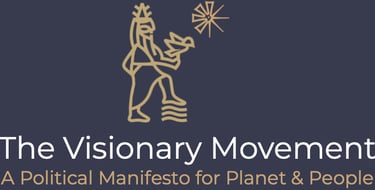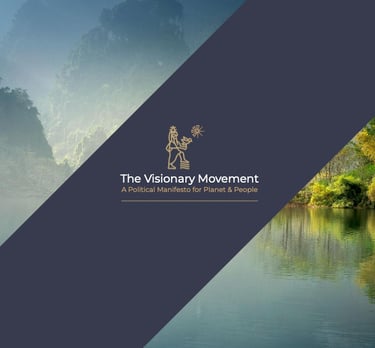SOCIAL CARE
Compassion first: building a social care system fit for everyone.


We Care: A Future We Can All Look Forward To
Your independence and well-being should never be compromised. Under Visionary stewardship, social care would be a basic human right afforded to everyone in the UK as and when they needed it.
The state of the mind and the state of the body; these two things lie at the core of our healthcare and social care systems. One attempts to help us preserve our physical health, whilst the other attempts to help us develop and sustain social skills and independence. Social care and healthcare are intrinsically linked but for many decades have been administered separately.
Combining Healthcare, Social Care, And Third Sector Services
It’s only been in recent years that the two departments have openly discussed integration as a means of reducing costs and boosting competences. That integration must not only continue but also be accelerated, by centralising healthcare and social care departments and providing easy access to information and support services in city centres, high-streets and rural areas.
Simply by streamlining and integrating existing services, we will improve efficiencies and reduce costs exponentially.
Introducing NVN:
A New, National Volunteers Network
Both our healthcare and social care systems are supported by a nation of volunteers, charities, community centres, advisory services, and support groups. Without that additional resource a crucial component of our nation’s infrastructure would collapse.
But that may well happen if we don’t prepare; as the population continues to grow, people live longer and the demand for those services increases. We must act now in establishing a stable system that delivers quality services as a direct result of streamlining working processes, reducing operational costs, and increasing efficiencies across the board.
We propose the merging of all health authority departments and registered third sector health and welfare organisations to roll out a new Social Care System; a system that would utilise a single platform to manage and operate all public health services and enable greater knowledge sharing and communication across the UK.
The National Volunteers Network (NVN)
The NVN would be open to all non-profit organisations, charities and community groups and their members.
By registering, organisations would have the opportunity to offload assets in exchange for access to operational facilities and healthcare resources that would better help their volunteers to serve their communities.
Not only that, but donations and funds—raised through the sale of assets—would go further, and more people would receive the help they so desperately needed.
Each NVN county division would fall under the remit of their respective local authorities.


The NVN Would Utilise:
National Health Service (NHS) hospitals, GP practices, and dental clinics.
Local authority town halls and offices
Council housing
Libraries
Community centres
Vacant or under-utilised council buildings
Vacant and derelict shops, homes, and warehouses
NVN Benefits
Enhanced Service Delivery
By integrating opt-in third sector organisations, healthcare charities, and the National Health Service, we can help more people in less time. Leveraging existing facilities such as NHS hospitals, GP practices, dental clinics, and community centres also allows for the efficient provision of services without the need for new infrastructure. This approach also ensures that resources are utilised effectively, leading to improved access and quality of services.
Economic Revitalisation
Transforming vacant and derelict properties into functional spaces will stimulate local economies. For example, adaptive reuse of commercial real estate has been shown to increase property values and attract businesses, thereby boosting local tax revenues.
Environmental Sustainability
Repurposing existing buildings reduces the environmental impact associated with new construction, including the consumption of resources and energy. It will also result in long-term cost savings through energy and water efficiency and improve the appearance of our high streets.
Cost Savings From Adaptive Reuse
Repurposing vacant properties can lead to significant cost savings. For instance, a study on supportive housing found that providing housing to chronically homeless individuals resulted in a net savings of nearly £30,000 per person per year in publicly funded services.
Public Infrastructure Savings
Implementing sustainable practices in public buildings can result in annual savings of approximately £3.7 billion through a 20% improvement in energy efficiency.
GET IN TOUCH
SUBSCRIBE FOR UPDATES
WhatsApp: +44 (0)7413 47 46 48
© 2025. All rights reserved.


FOLLOW
Support the movement: Make a Donation






